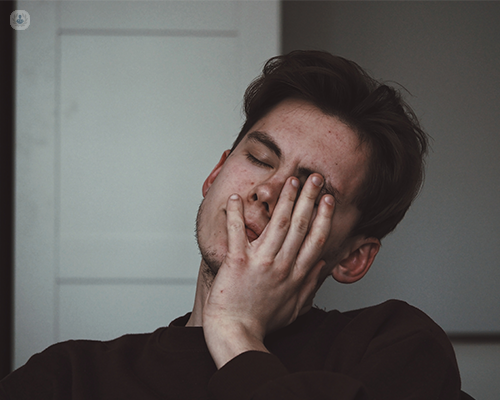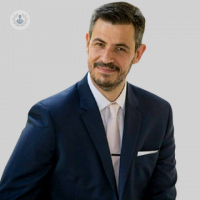What are signs and symptoms of post-concussion syndrome?
Escrito por:A concussion is a result of a head injury that causes the brain to rapidly shift back and forth. It’s a temporary brain injury, with symptoms that can last for several weeks. If the symptoms continue for longer than expected, however, it may be classified as post-concussion syndrome, but what exactly is this? Leading consultant neurologist Dr Ioannis Mavroudis shares his expertise on the condition, explaining what the signs are, how it can be diagnosed, and more.

What is the difference between concussion and post-concussion syndrome?
A concussion is a trauma to the head that may result in temporary loss of normal brain function. It is also known as a mild traumatic brain injury, and by definition, it does not have any findings on imaging tests, such as CT and MRI scans.
The aftermath of a concussion may include headaches, behavioural changes with irritability, agitation and short-temper, memory and concentration issues, problems with multitasking and future planning, changes to normal senses with anosmia (diminished sense of smell) and blurred vision, tinnitus (ringing in the ears), sleeping difficulties and low mood or depression. These are symptoms of post-concussion syndrome.
Is post-concussion syndrome a brain injury?
Post-concussion syndrome is the aftermath of a mild traumatic brain injury.
What are the signs of post-concussion syndrome?
There is no definition of post-concussion syndrome that is universally accepted. It’s generally accepted that the syndrome develops when at least 3 of the associated symptoms develop. These symptoms include headaches, dizziness, fatigue, irritability, issues with memory and concentration, insomnia, and lowered tolerance for noise and light.
There’s no definitive time frame for these symptoms. In literature, it ranges from occurring in the first week to three months after the initial concussion. It’s loosely accepted that post-concussion syndrome is when the symptoms occur and persist for several weeks. Persistent post-concussive syndrome (PPCS) lasts longer than one month to one year, depending on the author. Generally, however, it is used to describe any chronic symptoms that continue much longer than expected.
The International Classification of Diseases (ICD10) defines PPCS as a history of a traumatic brain injury (TBI) and at least 3 of the following symptoms: headache, dizziness, fatigue, irritability, insomnia, concentration or memory difficulty, and intolerance of stress, emotion, or alcohol. According to the American Psychiatric Association's Diagnostic and Statistical Manual of Mental Disorders, Fifth Edition (DSM-5), post-concussion syndrome is given a diagnosis of either major or mild neurocognitive disorder (NCD) due to TBI.
Is there a singular test to diagnose post-concussion syndrome?
There is no singular test to diagnose the post-concussion syndrome. The diagnosis is based on the symptoms that the patient will report, and on certain diagnostic tests that can be supportive of the diagnosis. The most widely used tests include the Sport Concussion Assessment Tool (SCAT5), which is used for sport-related concussions, and the ImPACT Version 4 test.
What is the ImPact test?
The ImPact test is a computer-based neurocognitive assessment programme that can be used to assist in concussion diagnosis and management. The ImPact baseline test can be performed at any time and the post-injury ImPact test can be done after a concussion. The post-injury test can be used to monitor the recovery from a concussion and can help with the management of post-concussion syndrome.
Can you recover from post-concussion syndrome?
Post-concussion symptoms usually take from 4 weeks to 6 months to start improving. In 10-15% of cases they may take up to 18 months, while in 5-10% the symptoms may persist for up to 3-5 years. Pre-existing history of mental health issues, like anxiety and depression, and previous history of head injuries, may increase the risk of prolonged post-concussion symptoms.
Can post-concussion syndrome last for life?
It is very rare for post-concussion syndrome to last for life, however, if it complicated by additional neurological or mental health issues, it may last for more than 5 years.
Dr Ioannis Mavroudis is a highly experienced consultant neurologist who treats patients in Leeds and London. If you would like to book a consultation with him, visit his Top Doctors profile today.


